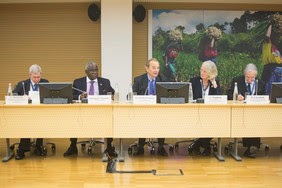Written by Francesco Farnè
On the eve of World Soil Day and its celebration through events in Bangkok, Rome and Santiago, The Guardian published Sir Gordon Conway's think piece Soil isn’t sexy- but it could explain hunger in Africa.
This was probably the most engaging way to introduce a topic that will be at the top of the global agenda in 2015 considering that the UN 68th General Assembly declared 2015 the International Year of Soil.
On 4 December, the Montpellier Panel launched its 2014 report, No Ordinary Matter: conserving, restoring and enhancing Africa’s soils, at IFAD headquarters in Rome. For those who may not be familiar with this body - The Montpellier Panel is a group of African and European experts in the fields of agriculture, trade, ecology and global development. The Panel's goal is to provide the necessary support to realize agricultural development and food security priorities in Sub-Saharan Africa.
The event brought together Sir Gordon Conway, Professor of International Development and Agriculture for impact at Imperial College, London, and Chair of the Montpellier Panel; IFAD President, Kanayo F. Nwanze; Camilla Toulmin, Deputy Chair of the Montpellier Panel and director of the international Institute for Environment and Development (IIED); David Radcliff, Senior Advisor for Agricultural Research for Development at DG Development and Cooperation, European Commission; and Henri Carsalade, Chairman of Agropolis Foundation Board of Directors.
President Nwanze introduced the topic underscoring importance of soil for Africa. He pointed out that soil depletion is a threat to farmers, food security and biodiversity. He reminded the audience that most of the rural people and smallholder farmers live in and cultivate land that has low quality soil.
After Dr Nwanze's introduction, Sir Gordon and his colleagues presented the Montpellier Panel report.
The research underpinning the report shows that almost 65% of arable land, 30% of grazing land and 20% of the forests in Africa are already damaged. This has huge economic costs, estimated to be more than $68 billion per year.
Moreover, the report highlighted that soil depletion is strongly interconnected with climate change, as it contributes to greenhouse gas (GHG) emissions, thus advocating to make sustainable soil management a global priority.
In conclusion, the panellists put on the table a number of policy suggestions and recommendations:
• Firstly, investments in sustainable soil management practices are crucial to Africa’s future. Financial support by donors and governments to R&D/innovation programs can really make the difference.
•Secondly, secure land rights are a basic condition for good land management. Land ownership can be an incentive for farmers to keep soil healthy.
•Thirdly, introducing soil evaluation methods is necessary to quantify the costs of land degradation.
•Lastly, it is important to embrace Integrated Soil Management (ISM). ISM aims at integrating green agricultural practices with a selective and targeted use of inputs.
This is just the first step towards the recognition of soil as a global priority. And hopefully, the International Year of Soil 2015 will open the way to addressing the issue of soil depletion in Africa.























